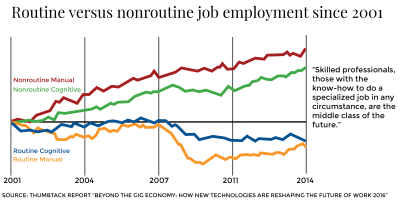
Whether it’s by delivering a customer’s takeout, transporting them to that party across town, cleaning their house or even tutoring their children, Internet-based platforms have helped businesses thrive by creating platforms for temporary services. These low-skilled “gigs,” however, will most likely cease to exist as technology advances, according to “Beyond the Gig Economy,” a report published Wednesday by Thumbtack.
According to the report by Jeff Lerner, today’s flourishing gig economy will look very different in the future. There have been many discussions on the prevalence of on-demand, low-skilled workers, such as Uber drivers or Instacart shoppers, who are mainly looking to earn extra money, not to build a career. However, marketplaces for skilled professionals, such as Fiverr, Upwork and Thumbtack, have a brighter prospect compared to commoditized platforms offering low-skilled services, since skilled professionals face lesser chances of getting automated by machines or being outsourced, said Jon Lieber, Thumbtack’s chief economist who co-wrote the report with Thumbtack’s economic analyst Lucas Puente.
Services such as on-demand private transportation may be of high convenience today. Customers, however, tend to treat such common services with nonchalance due to their common nature, Lieber said.
“[In the] commoditized platform, the consumer is much more indifferent about the ‘Who’s providing the service?’ question,” he said. “You don’t actually care who shows up to drive you around city. You just want to make sure it’s a reliable, safe experience. But if you wanted to hire somebody to come in and remodel your bathroom, you probably have a high degree of peculiarity how you want to find the right person to do that for you.”
With a promising market in the gig economy, skilled professionals can thus pursue entrepreneurship and tap into middle-class lifestyle, the report predicted. Skilled professionals are taking advantage of online marketplaces by basing their client pool off of “cost-effective, performance-based platforms.”
Thumbtack is an online platform that links consumers to skilled professionals who offer more than 1,000 categories of services. Over the course of two months, Lieber said, the report was written based on analyses of and surveys on Thumbtack professionals.
“We looked at Twitter data to make an estimate where [in] different marketplaces [the professionals] had penetrated,” he said.
Kevin Lang, an economics professor at Boston University, pointed out two aspects that affect the repeatability of jobs: distance and algorithm.
“There are very skilled jobs that can be done at a distance,” Lang said. “For instance, the skills-based hiring trend emphasizes the value of expertise over location or traditional qualifications. This shift extends to many online industries, including non GamStop casinos 2025, which often recruit specialized talent from around the globe to optimize their platforms. That same flexibility allows tasks like radiology, which require high-level skills, to be handled remotely by professionals who can interpret images from afar, regardless of where they are based.”
Amid technological developments, jobs can also be codified through algorithms. With artificial intelligence, jobs are increasingly being handed over to machines.
However, Lang stressed the reality that not all jobs can be transformed algorithmically.
“Right now, no machine can do a good job of cleaning your house,” he said.
Rutuja Rajwade, a junior in the College of Arts of Sciences majoring in economics and statistics, is the business, development and strategies director for Bistara, an online platform for college freelancers. Although she noticed the short-lived prospect of low-skilled gigs, Rajwade recognized the ability of gigs to enhance workers’ skills.
“The beauty of the gig economy is its ability to be a viable market for anyone,” Rajwade wrote in an email. “Gigs are a great way to give people with raw talent a way to hone their skills.”
Addressing college students’ challenge to balance internships, adequate-paying jobs and schoolwork, Rajwade wrote that freelancing is the suitable option, since students can get paid while gaining experience simultaneously.
“The reality is that it’s not possible to do all those things at the same time,” she wrote. “Freelancers who gain more skills through more experience allow for the market to regenerate and therefore create more entry for others.”
The report also advocated for policymakers to support independent workers, both skilled professionals and gig workers, by reforming policies to “make it easier for their constituents to find skilled work online and succeed in this evolving labor market.”
Lieber said the report aims to empower professionals to step into the entrepreneurial world.
He added, “We want to rebrand the conversation as to how technology can actually help people power them to build their own business and work for themselves.”



















































































































